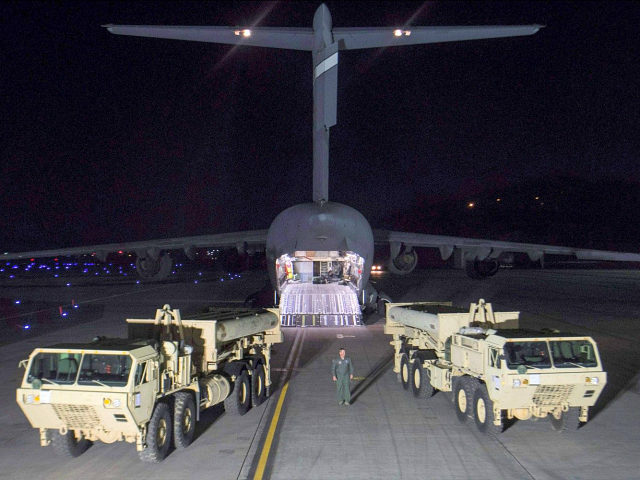A Chinese state propaganda outlet has threatened to make South Korea “feel the pain” for proceeding with the installation of an anti-North Korea missile system, while Chinese Foreign Minister Wang Yi predicts an imminent “head-on” collision between Pyongyang and Washington.
China has repeatedly objected to the deployment of the American Terminal High Altitude Area Defense (THAAD) anti-missile system to South Korea. The THAAD system is designed to protect from North Korean rocket attacks, though it is also capable of reaching into China and Russia.
A column in the state-run Global Times, an aggressive English-language government publication, warned this week that China would “step by step make South Korea feel the pain and make the US realize its mistake” in deploying THAAD. “The most essential task for China now is to boost its military power. The THAAD installation has offered China a crucial reason to increase and improve its tactical nuclear weapons,” the column suggests.
“It would be worth it if Beijing can comprehensively elevate its strategic nuclear power because of THAAD,” the column concludes.
The piece recommends Chinese nuclear weapons development, in contrast with a separate Global Times article that merely predicts it. “The THAAD installation will trigger international strategic imbalance and further dismantle the unified front against nuclear weapons,” the Times warns. “If a new Cold War erupts, South Korea will be at the forefront of the battlefield. This is not a curse but a foreseeable fact.”
While the Global Times typically uses belligerent, alarmist language to threaten the United States against increasing its worldwide influence, on this issue the publication appears to be in lockstep with the Chinese Foreign Ministry. Foreign Minister Wang Yi has not called for greater development of nuclear weapons but did warn this week in a press conference that he foresees a war between North Korea and the United States that could arguably take on a nuclear dimension, given dictator Kim Jong-un’s illegal nuclear weapons tests. Nuclear proliferation, he argued, was a natural consequence of deploying THAAD.
“More missile shields of one side inevitably bring more nuclear missiles of the opposing side that can break through the missile shield,” he argued. Of the United States and North Korea, he asked: “The two sides are like two accelerating trains coming towards each other. The question is, are the two sides really ready for a head-on collision?”
In addition to calling for the removal of THAAD, Wang demanded South Korea and the United States cease their annual “Foal Eagle” exercises, which began this week. 31,600 U.S. troops are participating in the exercises this month, which Pentagon spokesman Navy Capt. Jeff Davis described as “defensive in nature” and a 40-year-old tradition.
Despite criticizing America’s position on North Korea, Wang told reporters that he was optimistic about relations between the two countries, adding, “There is no reason why China and the United States cannot become excellent partners.”
On Tuesday, Foreign Ministry spokesman Geng Shuang echoed his boss’s assertions on the matter. “What I want to stress is that we are resolutely against the deployment of THAAD by the US and the ROK [South Korea] in the ROK, and will take firm and necessary steps to safeguard our security interests,” he told reporters at the daily press briefing.
“The situation on the Peninsula remains sensitive and complex. We urge relevant parties to keep calm, exercise restraint, and avoid any action that may provoke each other or even escalate the tension,” Geng warned.
Kim Jong-un’s government in Pyongyang has done nothing to diminish tensions with South Korea and the United States. On Monday, Kim presided over another illegal launch of ballistic missiles, which state media claimed was intended to prepare a strike against “the bases of the U.S. imperialist aggressor forces in Japan.”
“Respected Supreme Leader Kim Jong Un learned in detail about the preparations for fire strike while going round the ballistic rocket launching grounds,” according to the government propaganda newspaper Rodong Sinmun.
American Secretary of State Rex Tillerson is expected to travel to Asia this month, according to Japanese media. The State Department has confirmed that he will be meeting with allies in the region but has not provided a date.

COMMENTS
Please let us know if you're having issues with commenting.